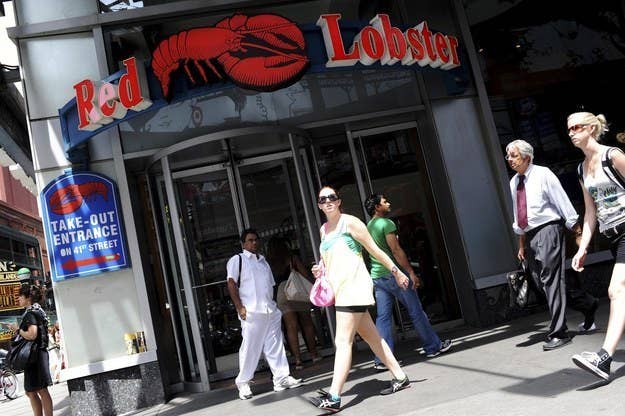
Darden Restaurants announced today that it will sell its Red Lobster chain for $2.1 billion to the private equity group Golden Gate Capital. The sale comes after years of lagging performance for one of the company's large, signature restaurants (the other being Olive Garden) and agitation by activist hedge funds with their own plans for restructuring the restaurant giant.
The deal is in all cash and will net the company some $1.6 billion after tax, $1 billion of which will be used to pay down debt and the rest to be used to help fund a share repurchase program of "approximately $500 million to $600 million" for next year, the company said in a statement announcing the sale.
"The agreement announced today is the culmination of a robust process to maximize the value potential of a sale or spin-off of Red Lobster and its real estate assets," the company said, "The all cash consideration provides Darden with immediate and certain value to reduce debt and support its capital return initiatives, including maintaining the Company's dividend, which Darden shareholders have stated is a priority."
Starboard Value, an activist hedge fund run by Jeffrey Smith that holds a 5.5% stake, for months has been promoting a different plan for Darden — keeping Olive Garden and Red Lobster together and spinning off the restaurant company's younger, faster growing brands like Longhorn Steakhouse and Capital Grille. The company, however, has been adamant about getting rid off Red Lobster and said today in an investor presentation that the deal would raise "substantial immediate cash for the Red Lobster business and eliminates Darden's exposure to future Red Lobster earnings risks and fluctuations."
Instead of selling Olive Garden, Darden recently revamped its brand image, indicating its commitment to the restaurant chain. Red Lobster accounts for about a third of Darden's over 2,100 hundred restaurants, but has declining same-store sales and three brand presidents since 2011.
"Today's announcement is the culmination of a highly competitive process designed to maximize the value of the Red Lobster business and better position Darden for success," Chuck Ledsinger, the lead director of Darden's board of directors said in a statement, "The structure of the agreement enables us to capture the value of Red Lobster and establish a market validated valuation of its real estate, while also enabling us to avoid the risks associated with continuing to operate the business in the current challenging environment."
Another hedge fund which owns a stake in the company, Barington Capital Group, has supported a plan for separating the older and slower growing lines from the younger ones and its chief, James Mitarotonda, said in March that Darden's plan to separate off Red Lobster and its declining financial performance had "caused us to lose all confidence in the ability of (CEO) Clarence Otis to manage the company."
The company's third-quarter earnings dropped 18% thanks to higher shrimp costs, failed promotions, and lower traffic into the company's restaurants.
The hedge funds had won a shareholder vote to hold a special meeting to vote on its Red Lobster plans. On Wednesday, Starboard said in a statement that it was worried " that the company may now be seeking to hurry through a sale of Red Lobster before holding the special meeting," due to comments it says Red Lobster's head of investor relations made to investors about announcing a deal to sell off Red Lobster in June or July. The meeting is yet to be scheduled.
The company said today that it had given "considerable weight to the significant amount of shareholder feedback received" since announcing its plans to separate Red Lobster in December of last year.
The company said that the "closing of this transaction is not contingent on the results of a Special Meeting" it still intends to file a proxy statement connected to the meeting and to "convene a Special Meeting as promptly as practicable." The company says it expects the deal to close in the first quarter of next year.
Jeffrey Smith of Starboard Value issued a statement Friday saying, "The announced sale woefully undervalues Red Lobster and its real estate assets. It is truly unbelievable that the current Board has the audacity to negotiate a transaction that does not require shareholder approval when a significant majority of Darden’s shareholders have formally demanded a special meeting on this very topic. If the company was intending to ignore the will of the shareholders and rush to do a transaction, you would have at least thought that it would have been a highly opportunistic transaction at a substantial premium to the underlying value of Red Lobster. However, that is clearly not the case and it appears that Darden has instead sold Red Lobster in a rushed transaction at a severe discount. We seriously question the decision to rush such a transaction rather than wait to hear the views and perspectives of shareholders on this critically important topic. Our suspicions all along have now unfortunately been confirmed -- this sale is the wrong transaction, at the wrong time, for the wrong reasons. This Board’s value destructive and self-serving actions fly in the face of corporate democracy."
